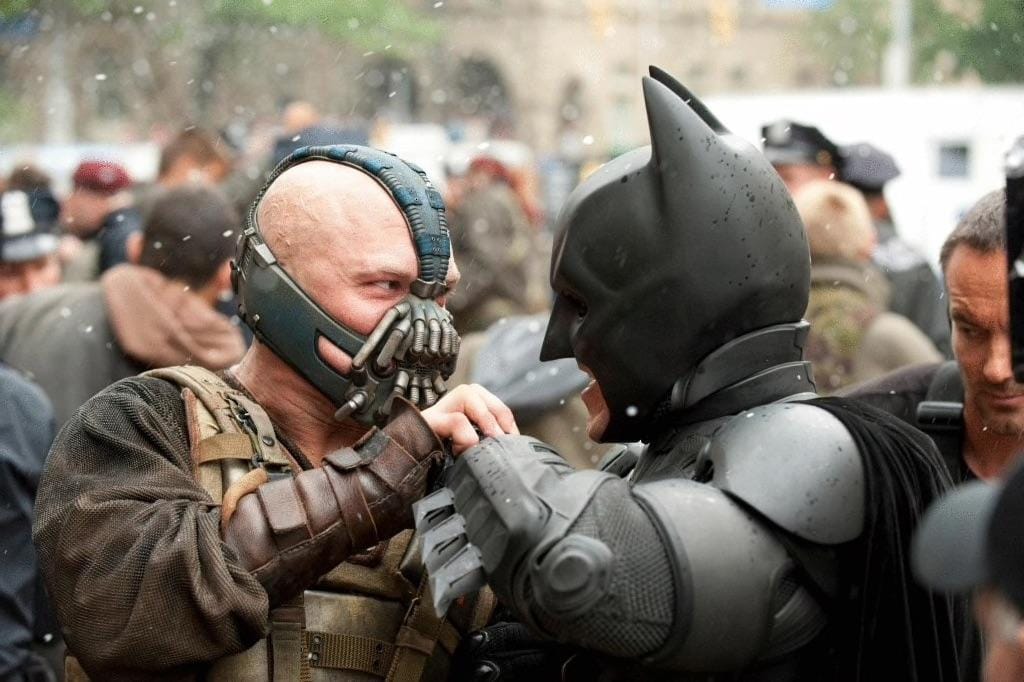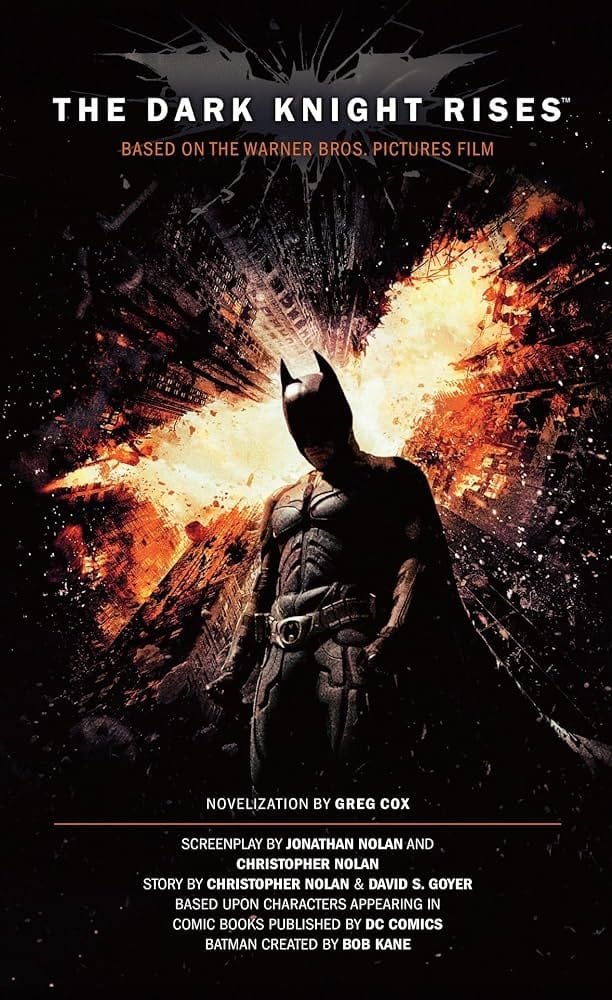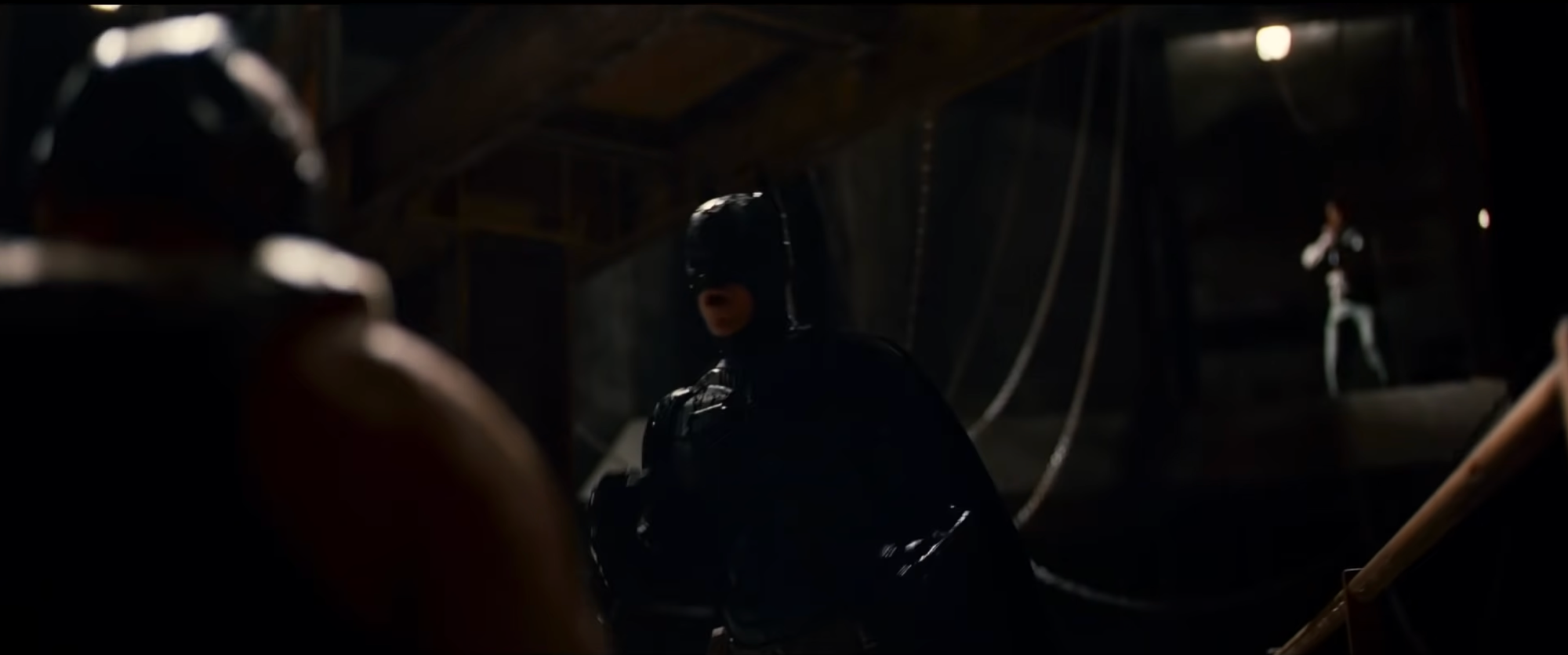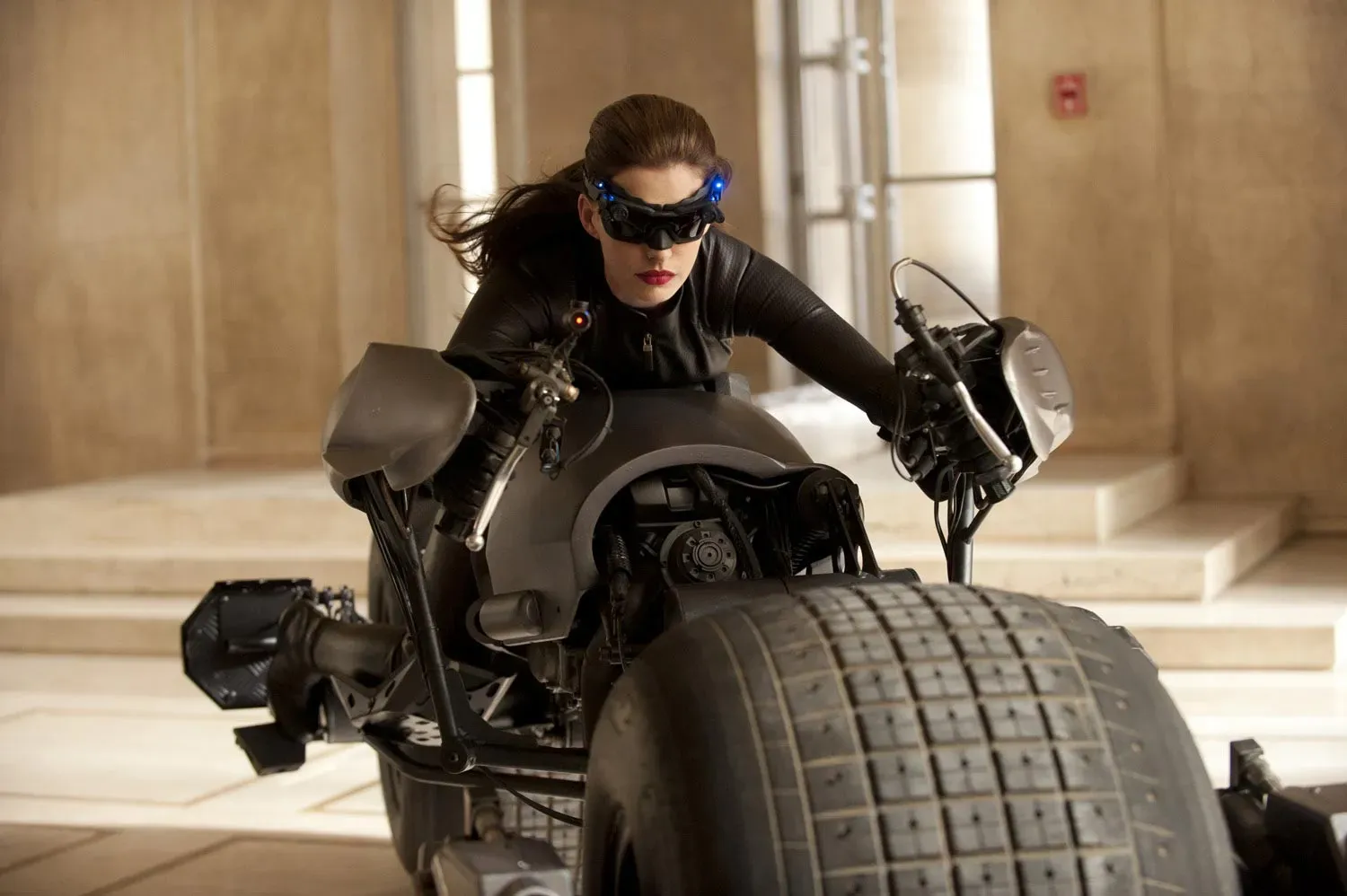Hollywood & Spine Archive: Darkest Knight, Part III
An overview of the novelization to THE DARK KNIGHT RISES, originally published in March 2021.

I totally understand why I was hard on The Dark Knight Rises as a novel - it simply doesn't hit the same way Denny O'Neill's previous Nolanverse books did - but re-reading this, I thought I was a little harsh on the film itself! I have watched Rises many times and never found it anything less than a satisfying and stylish conclusion to one of the only Batman stories I've let myself truly be invested in. But Greg Cox...[obnoxious Bane voice] he merely adapted the dark! (Originally published 3/29/2021)

The Dark Knight Rises by Greg Cox (screenplay by Jonathan Nolan and Christopher Nolan; story by Christopher Nolan & David S. Goyer; based upon characters appearing in comic books published by DC Comics - Batman created by Bob Kane [& Bill Finger]) (Titan, 2012)
The pitch: Eight years after taking the fall for The Joker and Harvey Dent's psychotic rampages across Gotham, there's no sign of Batman. But when a criminal mastermind with ties to Bruce Wayne's shadowy past enters the picture, our hero will be put to the ultimate test.
The author: Replacing Denny O'Neill after two Batman adaptations was Greg Cox, a notable name in the world of novelizations and tie-ins whose work includes book versions of Man of Steel, Daredevil and Godzilla as well as prose stories set in the worlds of Star Trek, Buffy The Vampire Slayer and even adaptations of major DC crossover events like Infinite Crisis and Final Crisis.
The lowdown: Completing the series set up by Batman Begins and The Dark Knight was likely no easy feat. Christopher Nolan ended his second Batman film with the Caped Crusader on the run from the police he'd tried to aid, and the villainous Joker was unlikely to return following actor Heath Ledger's untimely death (and a performance that earned him a posthumous Oscar). He decided to thread the needle by combining the gritty realism of The Dark Knight with some of the more fantastical comic book elements of Begins, tying the fearsome Bane to the League of Shadows, a group of assassins led by Ra's al-Ghul (Liam Neeson) in the first film. (Crucially, Nolan and his brother Jonathan remixed a handful of modern-classic arcs from the Batman comics into their screenplay, including Frank Miller's gritty The Dark Knight Returns, the Bane introduction arc Knightfall, and No Man's Land, which saw Gotham cut off by the world after a cataclysmic earthquake.)
With the Marvel Cinematic Universe underway at the time - world-conquering team-up The Avengers hit theaters months before Rises - and DC on track to assemble their own new vision (a Nolan-produced take on Superman, the Zack Snyder-directed Man of Steel, would hit theaters in a year), Nolan solely focused on finishing the story he'd start out to tell, about Bruce Wayn's monomaniacal quest to save Gotham City at any cost. The film is about as fine as it could have been, with an interesting performance from Tom Hardy as Bane and quirky turns from Anne Hathaway and Joseph Gordon-Levitt as the thief Catwoman and a hard-nosed cop who aids the Batman. In fact, if anything, it's the novelization that uncovers some of the story's weakest points.

Instead of actual Batman writer Denny O'Neill, Greg Cox was tasked with adapting The Dark Knight Rises for the page, and he easily succeeded. There's no question about it: his prose is solid and the images he conjures are firmly in line with what Nolan created for the screen. But after the novelizations of the first two films split the difference between Nolan's realistic vision and some comic-worthy quirks, Rises opts for service over splashy style - and depending on why you read novelizations, that might not be what you're expecting.
It's all rather striking: the Rises book clocks in at over 100 pages more than its predecessors, yet there's not a lot in the way of additional details that didn't make the final film. It never drags, but it's almost too in-step with what you'd watch. Part of the fun of reading novelizations is allowing a book to let you picture the movie in a slightly different manner: alternate angles, blocking, or line deliveries in the theater of the mind. As novelizations get increasingly niche over time, those second looks are crucial - less to help preserve the experience of watching (because home video options are easier than ever) and more to showcase the power of prose as art.
Thanks to the manner in which Cox tells the story, the story's stakes don't always feel high. Particularly unsurprising is the film's late-breaking twist (spoilers for an eight-year-old movie) that Wayne Enterprises board member Miranda Tate is actually Ra's al-Ghul's daughter Talia - who was name-checked in O'Neill's Begins book. The child who escaped from "the pit" (a neat enough rationalization of al-Ghul's Lazarus Pit from the comics) is never described by gender, but it feels pretty obvious that Bane is not that kid. The film's halfhearted, possibly unintended stabs at social commentary, with Bane whipping up Gotham's downtrodden into a class-based feeding frenzy, is thin in the book as well. (It might have always been that way, however - and the last five years of actual history don't make its murky viewpoints any clearer.)

The most colorful bits of The Dark Knight Rises occur around Catwoman - notably named as such here, which is not the case in the movie's straightforward universe. Cox delivers a sly nod to Selina Kyle's previous comics iterations when describing her accosting millionaire industrialist John Daggett (a character loosely based on a creation for the '90s animated series) in search of the mysterious "Clean Slate" computer program. "Furious brown eyes flashed menacingly, and when she lifted her hands, he saw claws," Cox writes. "Unbidden, the thought occurred to Daggett that some men would pay good money to be in his position right now. All she needed was a whip. [Emphasis mine]"
Later, when Selina is arrested and remanded to Blackgate Prison, Cox addresses the novel's biggest elephant in the room:
Blackgate Prison was a maximum-security penitentiary located on one of the smaller islands in Gotham Harbor. Now that the Dent Act had made it all but impossible for the city's criminals to cop an insanity plea, it had replaced Arkham Asylum as the preferred location for imprisoning both convicted and suspected felons. The worst of the worst were sent here, except for the Joker, who, rumor had it, was locked away as Arkham's sole remaining inmate.
Or perhaps he had escaped. Nobody was really sure.
Obviously Nolan would not deign to address that loose end - that's what a novelization is for. Yet these are but mere crumbs for the adaptation enthusiast to snack on. If you're looking for a more stringent adaptation of what you've seen, this is the one - but Cox's other works (including Man of Steel) had more room to run around in. You'd hope the Batman's wings wouldn't be as clipped.
The cutting room floor: The strict structure, combined with Nolan's avowed avoidance of deleted scenes, means there's very little else exclusively on the page. All we get here is a sliver of an extra scene with Detective John Blake (Joseph Gordon-Levitt's character) as he checks in with the orphans and staff at St. Swithin's after Bane tightens his grip on Gotham City. It's also worth noting that a supporting character, Matthew Modine's deputy commissioner Foley, got a much more violent death on the page that actually was filmed, according to the actor.
The last word: This is an able adaptation of The Dark Knight Rises and little more. What you expect when you add these books to your shelf determines whether that's enough for you.
